Involving others
At several points in this study session, we have mentioned the importance of involving others in the action planning process. We talked about the importance of:
- bringing people together to contribute different ideas
- building support and consensus
- agreeing ownership and accountability.
These three elements are important throughout the process, but they each have greater importance at different stages of action planning. Listening to experiences and asking for ideas is more important at the beginning of the process. As the action planning process continues, building consensus and support for the plan that is emerging becomes more important. As the development of the action plan nears completion, agreeing ownership and accountability become the most important element. Figure 1.2 shows the relative importance of each element at different stages and also provides a summary of some of the benefits and challenges in managing each stage.

Activity 1.2: Good practice in involving others in action planning
Here are two scenarios about action planning.
For each scenario, can you identify:
- any good practice
- any things that could be improved
- your response as the health worker in each case.
Scenario 1
A health worker has been told by his manager that they need to write an action plan in response to a consultation that was held with children. The consultation was about children’s experiences of accessing and using health services. The health worker is given a summary of the consultation findings. The consultation took place two years ago and was mostly with children in the capital city. The health worker is based in a rural community. The health worker has been asked to produce a draft of the action plan for the manager to review in two weeks.
Scenario 2
A health worker based in a children’s ward of a hospital has attended a two-day training course on preventing the spread of communicable diseases. She has learned a lot about good practice in these two days and when she returns to her ward she notices there are many things not in place and improvements that could be made. She talks to her manager about this, but her manager is not supportive, saying they are too busy to take on any more work now. The health worker has worked at the hospital for a number of years and knows some of the senior staff quite well, so she decides to talk to the senior manager about whether action should be taken. The senior manager says there is already a communicable diseases policy and action plan in place for the entire hospital, which she will try to find. She is supportive, but is very busy and asks the health worker to wait until she can get back to her.
Compare your answers to those at the end of the study session.
Revisit you own action plan from Activity 1.1 and think about how you might ensure children and others are involved.
Remember that action planning is not a one-off exercise. Planning actions and implementing those actions are steps in a process of continuous improvement in your practice. Action planning and learning from experience will give you a structure to advance children’s rights and improve the health of the people you work with. This is over and above the immediate services and support that you provide every day.
1.5 Involving children and others
